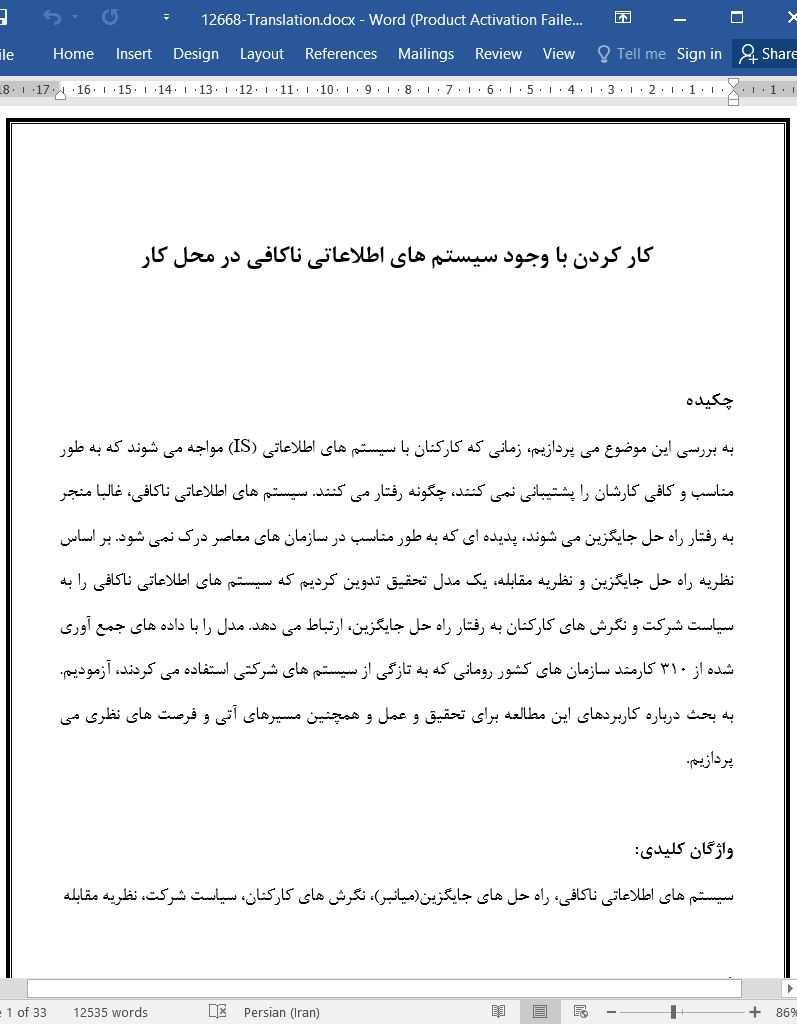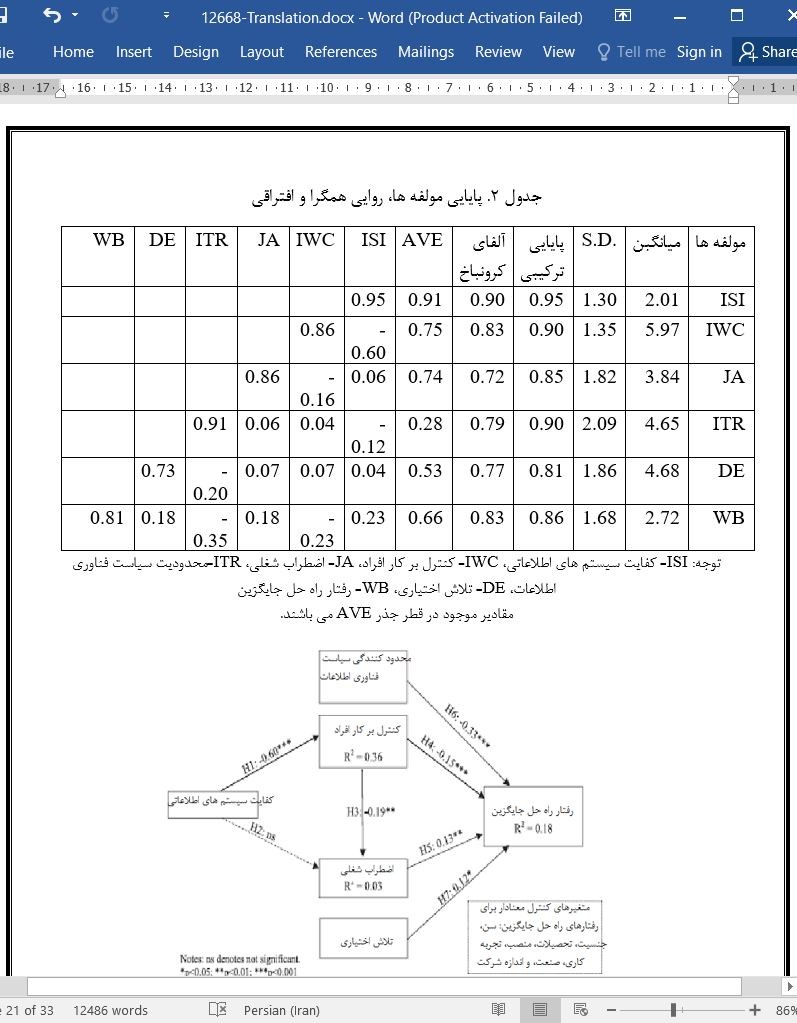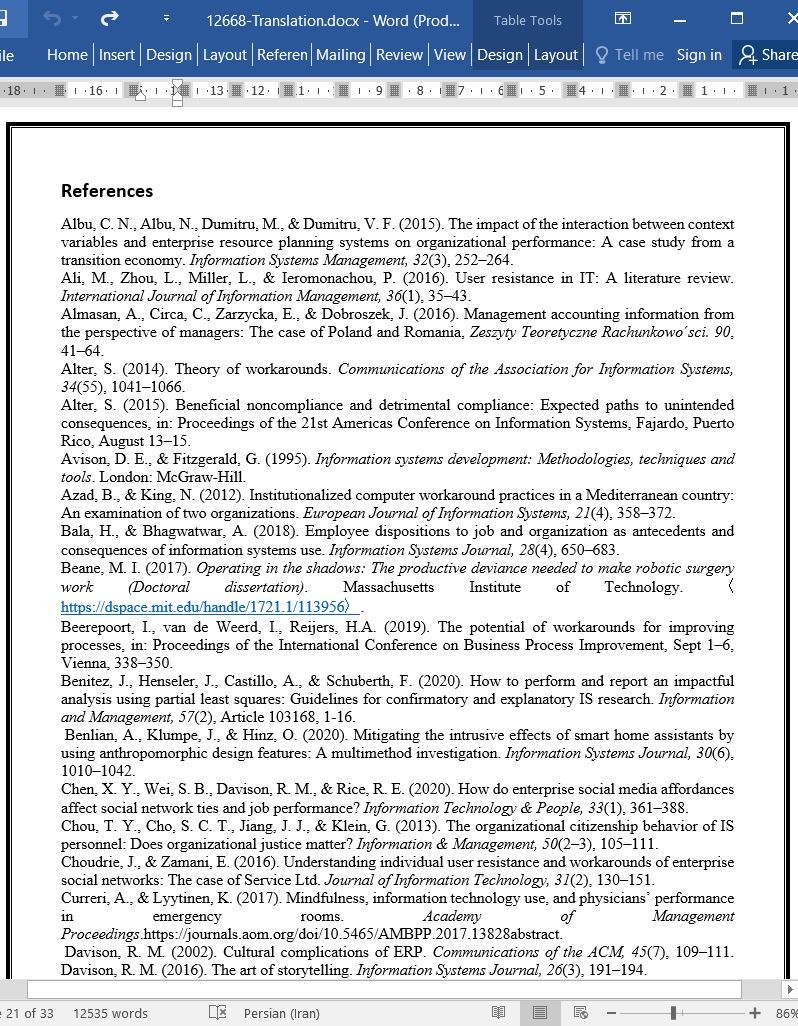
کار کردن با وجود سیستم های اطلاعاتی ناکافی در محل کار
چکیده
به بررسی این موضوع می پردازیم، زمانی که کارکنان با سیستم های اطلاعاتی (IS) مواجه می شوند که به طور مناسب و کافی کارشان را پشتیبانی نمی کنند، چگونه رفتار می کنند. سیستم های اطلاعاتی ناکافی، غالبا منجر به رفتار راه حل جایگزین می شوند، پدیده ای که به طور مناسب در سازمان های معاصر درک نمی شود. بر اساس نظریه راه حل جایگزین و نظریه مقابله، یک مدل تحقیق تدوین کردیم که سیستم های اطلاعاتی ناکافی را به سیاست شرکت و نگرش های کارکنان به رفتار راه حل جایگزین، ارتباط می دهد. مدل را با داده های جمع آوری شده از 310 کارمند سازمان های کشور رومانی که به تازگی از سیستم های شرکتی استفاده می کردند، آزمودیم. به بحث درباره کاربردهای این مطالعه برای تحقیق و عمل و همچنین مسیرهای آتی و فرصت های نظری می پردازیم.
1. مقدمه
سیستم های اطلاعاتی(IS) به طور گسترده به عنوان کنترل و استاندارسازی کار شناخته می شوند، که تاثیرات مثبت بر افراد و عملکرد سازمان دارند(ماداپاسی و دی سوزا، 2012؛ رادر، ویچ، چرمان و کرامر، 2014). سیستم های اطلاعاتی از طیف وسیعی از وظایف سازمانی، از ارتباطات تا بهره وری شخصی و در مقیاس جهانی، یکپارچه سازی افراد و فرآیندها، پشتیبانی می کند. در یک وضعیت ایده آل، کارکنان به طور موثر تحت پشتیبانی سیستم های اطلاعاتی قرار می گیرند، و می تواند وظایف خود را به طور اثربخش و کارا تکمیل کنند. با این وجود، گاهی اوقات میزان پشتیبانی سیستم های اطلاعاتی از افراد، کمتر از حد مطلوب و غیربهینه است.(چاداری و زمانی، 2016؛ داویسون، وانگ، آلتر و آیو، 2019؛ داویسانگ، وانگ و آیو و آلتر، 2021).
7. نتایج
در این مطالعه، به بررسی عوامل تعیینکننده مهم رفتارهای راه حل های جایگزین پرداختیم که کارکنان زمانی انجام می دهند که باید از سیستم اطلاعاتی استفاده کنند که به طور مناسب از نیازهای آنها پشتیبانی نمی کنند. بر سیاست های فناوری اطلاعاتی تمرکز کردیم که ممکن است نحوه انجام وظایف کارکنان را محدود کند، منجر به از دست دادن کنترل بر سبک کاری شود که توسط کارکنان تجربه می کنند. اضطرابی که کارکنان در رابطه با الزامات سیستم های اطلاعاتی ناکافی، تجربه می کنند و تلاش های اختیاری که کارکنان ممکن است در طول قراردادهای شغلی رسمی خود تجربه کنند. با توجه به اینکه کارکنان باید با سیستم های اطلاعاتی ناکافی مقابله کنند، از نظریه مقابله به صورت دیدگاه نظری گسترده استفاده کردیم. دریافتیم که اگر سیستم های اطلاعاتی ناکافی باشد که منجر به اعمال رفتارهای راهحلهای جایگزین میشود، کارکنان برای کنترل بر کارشان دچار مشکل می شوند.
Abstract
We explore how employees behave when faced with information systems (IS) that inadequately support their work. Inadequate IS often induce workaround behaviour, a phenomenon that is insufficiently understood in contemporary organisations. Drawing on workaround theory and coping theory, we develop a research model that links inadequate IS with corporate policy and employee attitudes to workaround behaviour. We test the model with data collected from 310 employees of Romanian organizations who currently use enterprise systems. We discuss the implications of the study for practice and research, as well as future directions and theoretical possibilities.
1. Introduction
Information Systems (IS) are widely recognized as contributing to the control and standardization of work, with positive impacts on individual and corporate performance (Madapusi & D’Souza, 2012; Roder, ¨ Wiesche, Schermann, & Krcmar, 2014). IS support a wide range of organizational functions from communication to personal productivity and the integration of people and processes on a global scale. In an ideal situation, employees are effectively supported by IS, and are able to complete their tasks effectively and efficiently. However, it sometimes happens that the extent to which IS support employees is sub-optimal (Choudrie & Zamani, 2016; Davison, Wong, Alter, & Ou, 2019; Davison, Wong, Ou, & Alter, 2021). For instance, the software embedded in IS may not map onto some (or all) of the processes that employees undertake, or it may cause those processes to become unnecessarily unwieldy. For instance, Davison et al. (2021) report how employees were inadequately supported in such regular activities as order management, inventory management and delivery management.
7. Conclusions
In this study, we explored some critical determinants of the workaround behaviours in which employees engage when they are required to use an information system that inadequately supports their needs. We focused on IT policies that may restrict how employees undertake their tasks, the loss of control over working style as experienced by employees, the anxiety that employees experience in connection with the requirement that they use inadequate IS, and the discretionary effort that employees may engage in over their formally contracted job requirements. Given that employees need to cope with the inadequate IS, we employed coping theory as the overarching theoretical lens. We found that employees experience difficulties controlling their work if the IS are inadequate, which leads to the enacting of workaround behaviours.
چکیده
1. مقدمه
2. مروری بر ادبیات پیشین
3. توسعه نظریه
4. روش
4.1. ایجاد اندازه گیری
4.2. نمونه و جمع آوری داده
5. تحلیل داده و نتایج
5.1. مدل اندازه گیری
5.2. مدل ساختاری
6. بحث
6.1. دستاوردهای نظری و کاربردها
6.2. کاربردهای عملی
6.3. محدودیت ها و مسیرهای تحقیق آتی
7. نتایج
منابع
ABSTRACT
1. Introduction
2. Literature review
3. Theoretical development
4. Methods
4.1. Measurement development
4.2. Sample and data collection
5. Data analysis and results
5.1. Measurement model
5.2. Structural model
6. Discussion
6.1. Theoretical contributions and implications
6.2. Implications for practice
6.3. Limitations and future research directions
7. Conclusions
References
- اصل مقاله انگلیسی با فرمت ورد (word) با قابلیت ویرایش
- ترجمه فارسی مقاله با فرمت ورد (word) با قابلیت ویرایش، بدون آرم سایت ای ترجمه
- ترجمه فارسی مقاله با فرمت pdf، بدون آرم سایت ای ترجمه



